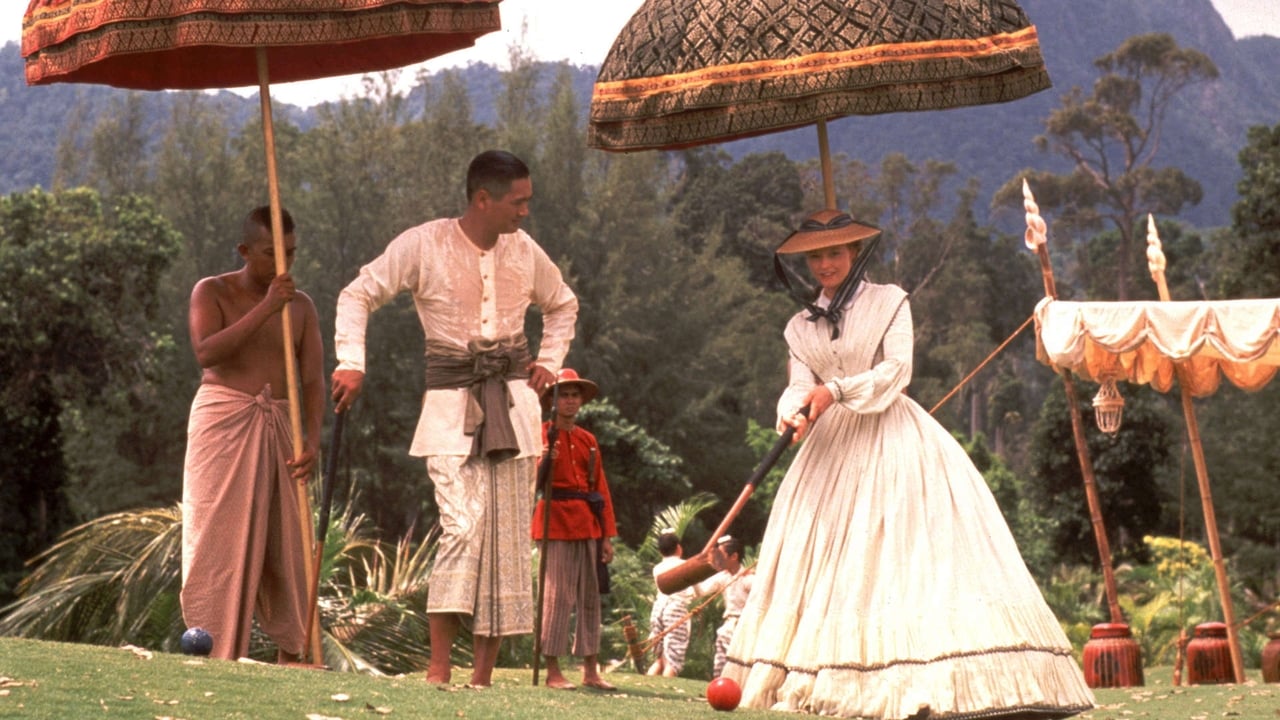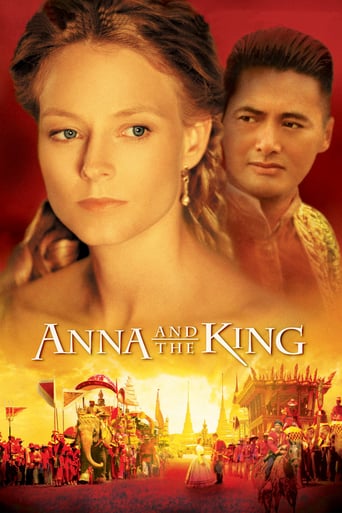

Sadly Over-hyped
... View MoreThe performances transcend the film's tropes, grounding it in characters that feel more complete than this subgenre often produces.
... View MoreThe movie's not perfect, but it sticks the landing of its message. It was engaging - thrilling at times - and I personally thought it was a great time.
... View MoreIt is encouraging that the film ends so strongly.Otherwise, it wouldn't have been a particularly memorable film
... View MoreAnna Leonowens is best-known today as the character played by Deborah Kerr in "The King and I", but she was a real person, not a fictional one, and her story was also told in the film "Anna and the King of Siam" from 1946 (which I have never seen). "Anna and the King" is Hollywood's second non-musical version of her story. Anna was a widowed British schoolteacher who travelled to Siam, as Thailand was then known, to become tutor to the many children and wives of King Mongkut. In reality she seems to have had little contact with the King himself, but her diaries suggested otherwise, and Westerners have long been fascinated by the supposed friendship which grew up between them. Some of the elements of this film will be recognisable to anyone familiar with "The King and I". Both films mention Harriet Beecher Stowe's novel "Uncle Tom's Cabin" and feature a doomed romance between Lady Tuptim, one of the King's concubines, and a commoner. There are, of course, lots of outrageously cute children running about everywhere. The fictitious subplot in which Anna helps the King foil a military coup by a treacherous general, however, appears to be an invention by the scriptwriters for this film. Like "The King and I" the film was banned in Thailand on account of its allegedly disrespectful portrayal of King Mongkut; it would appear that the country's lèse-majesté laws protect not only the current monarch but also his predecessors. This rather heavy-handed censorship seems strange in a country which claims (or did until the recent military coup) to be a democracy; imagine the storm of protest which would have been unleashed had the British government, for example, attempted to censor "Mrs Brown" because of the way it depicted Queen Victoria. The film could not, of course, be shot in Thailand itself, and filming took place in Malaysia. The casting of Chow Yun-fat rather than a European like Yul Brynner as Mongkut seems to have been an attempt by the film-makers to placate local concerns, but does not seem to have succeeded in this aim. Racial sensitivities in the Far East are not always the same as Western ones- the casting of three Chinese actresses as Japanese characters in "Memoirs of a Geisha" gave rise to protests in both China and Japan- and to Thais the casting of a Chinese actor as one of their country's most revered monarchs may have seemed just as insensitive as the casting of a Westerner. Chow's interpretation of the role is rather different from Brynner's- more sensitive and less autocratic and self-assured. One thing which may have offended the Thais is the depiction of the relationship between Anna and the King. With Kerr and Brynner, it was clear that their relationship was based upon friendship and mutual respect, but the question of whether they had actually fallen in love was left discreetly unanswered. With Chow and Jodie Foster it is all too clear that they are in love, if not lovers in the sexual sense, and the historical accuracy of this is (to say the least) doubtful. The emphasis of the story has shifted somewhat since the days of "The King and I". That film was made in the mid-fifties, a period when many regions of the globe were still under European colonial rule, something subtly reflected in the script. The Siam ruled by King Yul was a charmingly backward country which needed to be dragged kicking and screaming into the nineteenth century, a task which would have been undertaken by the colonial powers had its own ruler not resolved to do it himself. Here Anna arrives in Siam inwardly convinced of the superiority of Western culture and that her role will be to play a part in the enlightenment of a barbarian nation. As the story progresses, however, she realises that the real situation is far more complex and that the West has as much to learn from the East as vice versa. The teacher is taught. The film is visually attractive and beautifully photographed, and features an excellent performance from Foster, possibly the most accomplished Hollywood actress of the nineties. She also copes well with her character's British accent, something which cannot be said of all American actors called upon to play British characters. (Foster's gift for accents is one of a number of characteristics she shares with Meryl Streep, possibly the most accomplished Hollywood actress of the eighties). The film does, however, suffer at times from a lack of plausibility, particularly in the subplot involving the rebel general, something inserted to turn it into a standard thriller with an identifiable villain. Were Siamese soldiers of this period really so badly trained that they would have mistaken the sound of fireworks for that of gunfire? "Anna and the King" makes for enjoyable viewing, but it might have worked better with a different denouement. 7/10 Some goofs. The story takes place during the early 1860s when King Mongkut would have been in his sixties, far older than the character played by Chow Yun-Fat. Reference is made to the "King of France", even though at this period France was ruled by Emperor Napoleon III. Admittedly, the distinction might have seemed academic to the Siamese, but no French diplomat would have committed the solecism of referring to his monarch as "le Roi" rather than "l'Empereur". And the royal children sing the song "Daisy, Daisy", which was not written until the 1890s, possibly as a satirical comment on Daisy Countess of Warwick, mistress of the Prince of Wales.
... View MoreI knew nothing about the history of Thailand or the king portrayed in this film based on a true story when I watched it, so I approached it from a purely entertainment angle. It delivers as an entertaining, artistic and engaging film. The story line is interesting, the leading actor and actress are credible and the scenery is stunning.Since then I have found out a bit more about the historical value of the king and his impact on the country. The teacher's influence on the king has understandably been exaggerated to suit the film's needs, but what I was disappointed with was the wasted opportunity to capitalise on the richness of the history and the significance of the events that played out.The act of betrayal that the king experiences, the simply beautiful location, the spirituality of the king and his people and the political motives of the aggressors were all present, but the film tried to relate them all to the romance between the king and the teacher. They should have been tapped into in their own right and the romance shouldn't have been the primary focus of the film. I do understand that was the point of the film, but I think Hollywood's habit of looking for romance in everything meant they missed what would have been a great film without the need to rely on tried and tested method. I guess romance sells and film makers nowadays want to produce safe films that will sell, rather then genuinely explore interesting events, but this is one of those films where the director should have been braver and respected the audience's intelligence.Still, as I said, it's an entertaining enough film, but I did not enjoy the, at times, cringe-worthy romance. Could have been an epic in my opinion but shame.
... View MoreAndy Tennant the director of films such as Hitch and Fools Rush in directs this re imagining of The King and I.Although everyone already knows the basis of the story before they even sit down to watch this film Tennant is smart enough to combine elements that we know and love with new concepts while making the film far more visually interesting than the musical ever was.Jodie Foster does well with her role while there is also a nice early appearance of Tom Felton who Harry Potter fans will know as Draco Malfoy in the role of her son.Not quite sure this film can be placed in the same category of films like Gladiator or Braveheart as others have claimed but it is an enjoyable enough film.
... View MoreIn my opinion, Anna and the King is truly a wonderful love story that shows us how love knows no boundaries. Anna Leonowens, a widow played by Jodie Foster, comes to Siam with her son to be the teacher for the children of the King of Siam, King Mongkut, played by Yun-Fat Chow. This film does not start out as a love story; there are rumors of war with Burma, and just every day issues that the King has to deal with. Not to mention that the King finds Anna to be a very difficult woman. It is amongst his daily routine as King and his dealing with prominent issues, that a beautiful love story unfolds.As she does not know the traditions of Siam and does not possess the understanding as to why certain things are done, it is a learning curve on both the King and Anna's part. Anna constantly challenges the King's authority, and thinks that the King should do things the British way. There are times in the film where the King sees Anna's point of view and changes his mind. On the other hand, when she blatantly tries to command him to reverse one of his decisions, the King has no choice but to follow through with his decision. This is the point at which, Anna realizes that although the King has come to value her opinion, he is still the King. The further into the film you get, you realize more and more that the King is valuing Anna's opinion, and she is realizing and learning that the King not only values her opinion, but he seeks it out if she is patient.Throughout the film, as the King resolves conflicts not only between himself and Anna, but even with his daily duties as King, you begin to realize that the King and Anna are falling in love. Just as the lighting in the film plays a major but subtle role in the portrayal of the events, the King and Anna's falling in love is a subtle occurrence, similar to the subtle romance of Australia. When the King is holding Anna in his arms as they waltz a British waltz, the angle at which the camera is held, you finally see the love they have for each other etched all over their faces.While some may argue that there is not enough reality, accuracy of history, or love scenes, I still think Anna and the King is a wonderful movie that portrays that love can cross nationalities, classes, and is a classic for the ages.
... View More